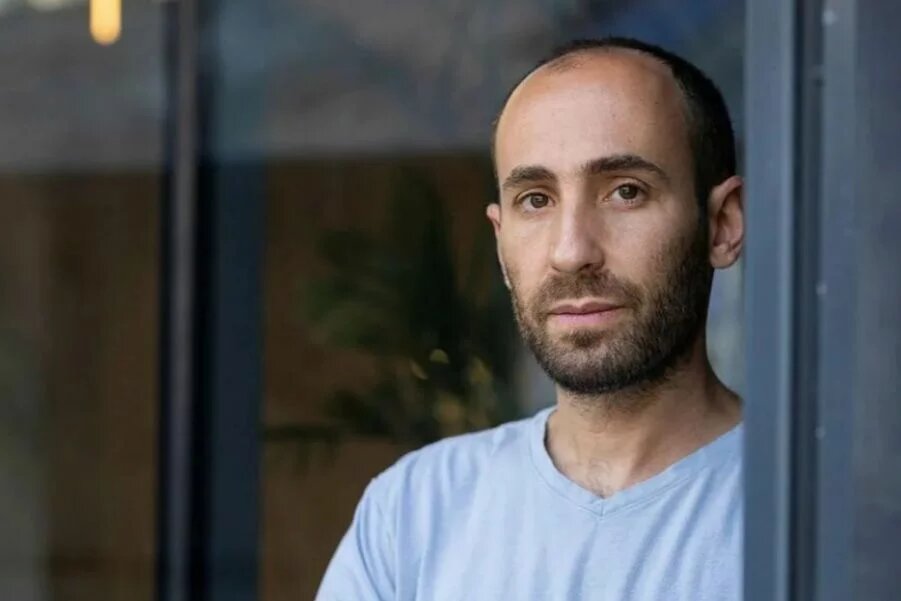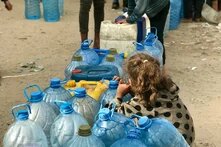On 7 October 2023, peace activist Vivian Silver was killed by Hamas in her home in Kibbutz Be'eri. Since then, her son Yonatan Zeigen has been campaigning for an end to the war in Gaza and a solution to the Israeli-Palestinian conflict. Hannah El-Hitami spoke to him.

On 7 October, your mother was killed by Hamas. After this painful loss, how did you come to be one of the loudest voices for peace in Israel?
I wasn't politically active before 7 October. But after the loss of my mother, I had a personal need for healing. I wanted to do something about the helplessness I felt that day. I also felt a political responsibility, an urgent need, to become active. The events of 7 October were a very personal experience for me, but this quickly became public. Initially, I campaigned with the families of the hostages for their release. I gave a lot of interviews and met with diplomats.
Because you had no certainty on your mother's fate until November?
Exactly. After Vivian was identified, I felt the need to take responsibility. I suddenly had the status of a bereaved relative. It was sad, but at the same time it gave me a platform. I decided to use my voice to pass on my mother’s message.
Which message is that?
It’s very simple: peace. I am committed to ensuring that we use this tragedy as the starting point for something new. If I hadn’t been personally affected, I imagine no one would be interested in what I have to say. But because they are, I owe it to my mother, my children, and our peoples to advocate for change. I don't see how I can just go back to my previous life and do nothing. Without an end to the occupation and to the conflict, life here cannot go on. I want to be a part of this, to do what I can to bring about change.
Among the leading peace activists in Israel today are people who, like you, lost loved ones on 7 October. How do you manage to continue calling for peace despite these painful losses, instead of experiencing deep feelings of revenge, for example?
I'm often asked that question. The assumption is that this is taxing for me, but it's not. It’s just how I think. I can feel anger, sadness, despair – maybe even the desire for revenge. But my feelings and my rational mind are not the same thing, even if they influence each other. When I experience pain, I think about how to deal with this pain. I use my mind to do this. Will my pain be alleviated by more suffering and war? Undoubtedly not. The only way to heal my pain and give it meaning is to create a situation in which it won’t happen again. This is only possible through peace.
A year has passed since the Hamas attack. The war in Gaza has been going on since then. Did you expect the situation to unfold as it has?
Yes and no. Everything feels so inevitable and at the same time so surprising. When war breaks out, you expect it to get increasingly complicated and cruel, and the likelihood is that it won’t be over in a week. At the same time, I find it hard to believe that it's already been a year and that no end is in sight. I keep swinging between hope and despair. I had expected 7 October and Israel's heavy response to be a decisive turning point in this conflict. And maybe we're in the middle of it right now. Something is brewing. I think we are on the cusp – either of a completely new, better reality for Israel and Palestine, or the worst is yet to come.
In an interview you gave six months ago, you said that Israelis don't want peace. Are you still of that opinion?
But actually, what people want is a good life.
Nothing has changed in this respect. This is the result of years of dehumanisation on both sides. Israeli and Palestinian society have both surrendered too much power and legitimacy to fundamentalist extremists. As a result, we’ve lost sight of the possibility of peace. Now we say it's too complicated. But actually, what people want is a good life. They would not oppose peace. We need a strong civil society and a political vision that makes it clear that Israelis can only be safe, and Palestinians can only be free, if we come to an agreement that is genuine and lasting. As soon as the political leadership commits to this, public opinion will change.
Is this possible under the current government?
No. That's why we need the international community. When I talk to representatives in other countries, they say: change has to come from you. But I ask: how can this happen if we have a blind sport that you are constantly fuelling? The international community is investing resources in the status quo. Their financial and diplomatic support is unconditional. We enjoy the privileges of an occupying power. If no one makes it clear to us that this is a problem, why should we change? We Israelis think that we have a security problem and need more weapons to solve it. Germany, Europe, and the United States support us in this belief. But security is only the symptom. The problem is the occupation, but Israelis won't come to understand that without outside help.
What concrete signals could the international community give?
It could sanction banks and break off diplomatic relations until something changes. Alternatively, more resources could be invested in joint political and civil society projects between Israelis and Palestinians. This would incentivise political actors in the country to work towards a solution. They could make it clear to their voters: there is a package. We are getting support from outside to create a new reality that is safer, more economically developed, better. The only thing we have to give up is the crazy idea that we have to dominate the Palestinians. That’s all! But as long as we’re left to our own devices, all those who want peace will be seen as traitors. There is neither any incentive nor any legitimacy to advocate for it.
It's hard to talk about peace in Israel right now.
Have you also been labelled a traitor?
I don't read comments on social media. But our work is being marginalised, even in left-wing circles. It's hard to talk about peace in Israel right now.
What form would such a peace take?
The details will fall into place as soon as we agree that we are serious about finding a solution. There could still be a two-state solution. Personally, I am more in favour of a federation or confederation. There are various ideas. For me, the most important thing is that we all sit around the same table with the will to reach an agreement that works for both sides. Israel wants security; the Palestinians need human rights, freedom, equality, and self-determination. If we come together with these ideas and not with religion and ideology, then it'll be quite simple.
Most Israelis have never spoken to a Palestinian, let alone one without Israeli citizenship. Through my peace work, I have built relationships with Palestinians for the first time. We are just ordinary people, and it’s so easy for us to come together. When we sit down with each other like that, anything seems possible.
At what moments do you feel that your work is making a difference?
It's hard work knocking on closed doors again and again. But I have the feeling that what I do makes a difference. Sometimes, at the end of an event, I can clearly see a change in the participants. I was recently the guest of a Jewish community in Los Angeles. When I said that, as Jewish people, they need to use their political influence to put pressure on their government, they all applauded. I am seeing small changes in the discourse and in international politics. Of course this isn't all down to me, but I'm part of a collective effort to make it happen. It's going too slowly, and it's not enough, but there’s a development in the right direction. And I hope that I can push it forward.
I also find it very rewarding to see that my children are proud of me. I have their support. They are also taking an interest in the idea of peace. My son is preparing a presentation for school at the moment. About a year ago, he gave a presentation on mythical creatures. This time, he has decided to talk about peace. He came up with the idea all by himself, without any input from me. I find that really moving.
How will you spend 7 October 2024?
With my family and the community in the kibbutz. I will mark the death of my mother in November. Then we will present the Vivian Silver Impact Award, for the first time. The award will be awarded annually to two women – one Jewish and one Palestinian – who are committed to coexistence, peace, and the advancement of women.
Interview conducted by Hannah El-Hitami.
The audio version was created artificially.

